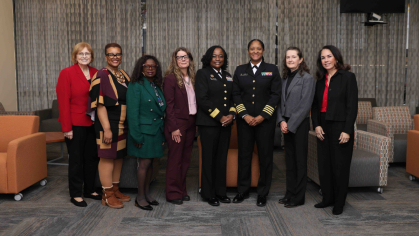Rutgers School of Social Work will be represented at the National Association for Social Workers New Jersey (NASW-NJ) Annual Conference from April 14-16, 2024 by a number of presentations and learning opportunities being hosted by our faculty and alumni. See the list below for a list of Rutgers SSW-affiliated presentations.
Helena D. Lewis, DSW, LCSW, LCADC, CCS (MSW and DSW alum); Asa Paris, DSW, LCSW, LCDAC (DSW alumni)
Why Dignity Matters? Parenting & Incarceration
April 14, 2:30-4:30pm
This presentation explores the need for anti-oppressive trauma-informed care to address physical and symbolic losses in the age of COVID-19. Both clinical and practical tools for intervention, advocacy, and the development of grief services will be provided.
Michael C. LaSala, MSW, PhD, LCSW (Professor)
Working with Families of LGBTQ Adolescents: Coming Out, Transition, and Support
April 14, 2:30-4:30pm
A growing number of LGBTQ+ youth are coming out at younger ages, and quite often the first person to whom they come out is a parent, potentially plunging the family into crisis. In this workshop, participants will learn family-based interventions to assist families struggling with coming out.
Dunia M. Garcia, DSW, LSW (DSW alum); Kwame Scruggs, PhD
Harnessing the Power of Myth: Healing Trauma Through Narrative Circles
April 14, 2:30-4:30pm
This interactive workshop will highlight narrative circles as a safe place where we can share traumatic experiences, face our fears, and find healing. This presentation will provide illustrative examples for direct application to include group processes and the telling, discussion, and analysis of mythological stories.
V. DuWayne Battle, PhD, MSW (Teaching Professor; Assistant Dean of Bachelor's Programs; Director, BASW Program in New Brunswick; Campus Coordinator, Baccalaureate Child Welfare Education Program) & Dawn Apgar, PhD, LSW, ACSW (MSW, PhD alum)
Social Work Student Leadership Program
April 15, 10:30am-12:30pm
Juan Rios, DSW, LCSW (MSW, DSW alum)
A New Dawn: Psychedelic Approaches to Healing Trauma
April 15, 2:30-4:00pm
Psychedelic medicines show great promise in the healing of trauma and PTSD. Unfortunately, the current best practices in the treatment of these conditions have proven only minimally effective, often leaving survivors to battle lifelong debilitating symptoms. Social workers, as America’s largest group of mental health care providers, need to consider new treatment models that challenge the Treatment-As-Usual (TAU) status quo when working with this population. However, overcoming skepticism and stigma, both within our profession and amongst the public, is necessary for trauma survivors to have access to the healing benefits that these breakthrough treatments can offer.
This presentation will discuss two psychedelic medicines (i.e., ketamine, MDMA [methylenedioxymethamphetamine]) and best practice treatment protocols for trauma. The presenters will explain 1) the effects of these medicines 2) their mechanisms of action in the brain 3) the social worker’s role in Psychedelic-Assisted Therapy (PAT) for trauma 4) the benefits and risks of PAT for trauma, and 5) evidence-based treatment modalities that have been demonstrated to be effective and safe for social workers and their clients.
Ethical and legal considerations, equitable access, and culturally sensitive practices for people of color and LGBTQIA+ clients will also be discussed. An audience Q&A will follow.
Rupa Khetarpal, MA, MSW, LCSW (Associate Professor of Teaching, Director of the Certificate on Interpersonal Violence & Trauma)
Cultivating Joy and Liberation through Trauma-Informed Anti-Oppressive Social Work
April 15, 5:00-6:30pm
Intersectionality has been a buzzword in the mental health arena for some time, but what does it really mean—and how does it affect the treatment of trauma? Join our panelists to explore the impact of oppression, including, but not limited to racism, sexism, ableism, heterosexism, and classism. Using the Minority Stress Model, the panel will discuss how the intersections of identity based traumas lead to trauma experiences that differ from other forms of trauma experienced by people from dominant social identities. The panel will conclude by presenting strategies to mitigate personal and organizational biases and challenging you to integrate culturally rooted approaches into your practice and begin the process of unlearning to relearning in order to decolonize your work!
Stephanie Cedeño, DSW, LCSW (DSW alum)
Connections Beyond Borders: Working with Refugee and Unaccompanied Youth from Latin America
April 15, 10:30am-12:30pm
Each year, unaccompanied youth embark on a treacherous journey from Latin America to the United States. This presentation will follow the journey of unaccompanied youth by discussing the three stages of migration, the risks, and protective factors throughout all stages. In addition, the unique migratory grief and loss experiences of refugee and unaccompanied youth will be discussed. Cultural brokering will be introduced as a necessary framework for school social workers and other school mental health practitioners to incorporate in their work to reduce the
isolation unaccompanied youth experience and help repair ruptured relationships caused by migration.
Kara Beckett, DSW, LCSW (DSW alum)
Addressing Racial Trauma Among Black Men: Clinical Strategies for Social Work Practice
April 16, 11am-1pm
Equipping social work professionals to address the mental health impacts of racial trauma on Black men is imperative. This workshop will cover recognizing and responding to racialized trauma and promoting cultural humility in clinical practice. Participants will learn practical clinical strategies for working with Black men to effectively support and heal.
Anthony Nicotera, JD, DSW, LCSW (DSW alum)
Revolutionary Love and Healing Resistance: From the Cycle of Socialization to Liberation
Tuesday, April 16, 11am-1pm
This interactive, multimedia workshop will introduce notions of revolutionary love and healing resistance, cycles of socialization and liberation, and the Circle of Insight process as tools for helping social work and mental health professionals and advocates actualize their commitment to well-being and social justice. In the midst of racial and economic injustice, environmental and health crises, growing polarization and violence, and individual and collective trauma, this workshop will provide participants with insights, stories, and strategies to help deepen their personal and professional commitment to healing and just practice.
Robin C. Wiley, LCSW (DSW alum)
Creating a Trauma Informed Practice for Older Adults
Tuesday, April 16, 11am-1pm
This workshop will focus on the importance of incorporating a trauma informed approach in our work with older adults. Using case examples, participants will leave this workshop with enhanced knowledge of the importance of recognizing the potential traumatic events faced by the aging client.



